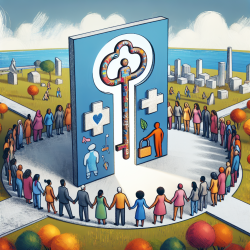Introduction
In the world of cystic fibrosis (CF), where daily management is already a Herculean task, mental health issues like depression and anxiety can add a significant burden. Recent research led by the International Committee on Mental Health in Cystic Fibrosis has shed light on the prevalence of these psychological challenges among individuals with CF and their caregivers. The study, published in Thorax, emphasizes the need for systematic screening and intervention to improve health outcomes and quality of life.
The Study's Key Findings
The research indicates that individuals with CF and their caregivers experience depression and anxiety at rates significantly higher than the general population. For instance, depression affects 8-29% of children and adolescents and 13-33% of adults with CF. Anxiety is prevalent in 30-33% of adults. Caregivers are not spared, with 20-35% reporting elevated depression scores.
These psychological symptoms are not just numbers; they correlate with decreased lung function, lower body mass index, worse adherence to treatment, and more frequent hospitalizations. The study underscores the importance of addressing mental health to improve overall health outcomes in CF patients.
Recommendations for Practitioners
The consensus statements from the study provide a roadmap for practitioners:
- Screening: Annual screening for depression and anxiety using validated tools like the PHQ-9 and GAD-7 is recommended for individuals aged 12 and above, as well as for caregivers.
- Intervention: A stepped-care model is advocated, starting with psychological interventions such as cognitive-behavioral therapy (CBT) for mild to moderate cases, and combining with pharmacotherapy for severe cases.
- Education and Prevention: Ongoing education and supportive interventions should be provided to all individuals with CF and their caregivers to promote effective coping skills.
Implementing Change in Practice
For practitioners, implementing these guidelines means integrating mental health screening into routine CF care. It requires collaboration with mental health professionals and the development of referral networks for comprehensive care. Practitioners should also be prepared to address barriers such as resource limitations and ensure that screening tools are used consistently and effectively.
Encouraging Further Research
The study highlights gaps in current research, particularly in the treatment of depression and anxiety in CF. Practitioners are encouraged to contribute to ongoing research efforts and to stay informed about emerging evidence that can inform practice. This is crucial for developing more effective interventions and understanding the complex interplay between mental health and CF.
Conclusion
Addressing mental health in CF is not just an add-on; it's an integral part of comprehensive care. By following the recommendations of the International Committee on Mental Health in Cystic Fibrosis, practitioners can significantly improve the quality of life and health outcomes for individuals with CF and their caregivers.
To read the original research paper, please follow this link: International Committee on Mental Health in Cystic Fibrosis: Cystic Fibrosis Foundation and European Cystic Fibrosis Society consensus statements for screening and treating depression and anxiety.










